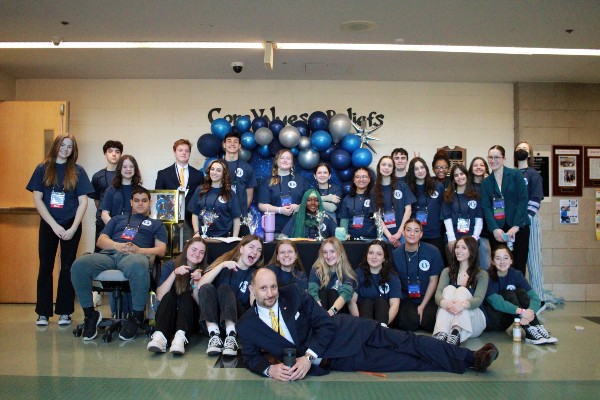“There are twenty-four whole hours in a day, you have plenty of time.”
“Oh you’re young, you’ll have time!”
Twenty four? That’s it?
Let’s face it, some high school students would need at least 30 hours in a day to ensure they get enough sleep while trying to balance their schedules.
And also, let’s accept the fact that anyone who ever said that high school students are lazy and sleep all of the time probably attended home school or didn’t attend school after eighth grade.
The truth is, for most children, high school is stressful and there often aren’t nearly enough hours in the day to be a fully functioning well-rested human while maintaining sanity.
To provide a sort of representation of the schedule of the average teenager who is involved, spends a decent amount of time on school work, and needs to pursue certain duties of being alive, I have listed the amount of hours average activities take in the average day-to-day life of a student…
…and it may look something like this
- One hour to get ready in the morning
- Seven hours of school
- One hour of after school activities
- Two- three hours of after school sports
- Three- four hours of an after school job
- Three hours of homework and studying
- One hour to eat
- One hour to transport between various locations
- One hour of communicating and socializing with other humans/trying to not isolate yourself from the world while you drown in responsibilities that no one ever prepared you for/ have the world rag on you while saying that teens are extremely irresponsible and should wait to get into the “real world” because the “fake world” millennials are living in is much too pampering and not at all representative of real human duties
… While the last point may be a stretch, if you take time to add up all of these hours, it adds to a minimum of twenty hours and a maximum of twenty-two hours, which leads to two to four hours of sleep.
Personally, I believe I am a mediocre student. I have mainly A’s and B’s in all of my classes, I am in two AP classes; I am a member of Woodland Worldwide, Best Buddies, Hawk Wings, I participate in outdoor track in the spring, I co-run a tutoring program, and I work two-three times a week. Being very involved, I get very little sleep. I would say I get an average of five to seven hours, rarely seven.
During rough weeks where sleep is especially hard to come by, I will take naps during class, in between passing times, or even in my car if I’m early for something. Desperate times call for desperate measures, and sometimes “resting your eyes” in the middle of a class is completely necessary to ensure that you will be able to stay awake until odd hours of the night.
In extremely low times, I have left school in the middle of day, went home to take a nap, and come back in time for last block. That, I am not proud of, but it just goes to show how determined a sleep-deprived high school student can be to get some rest.
But I am not alone. In fact, I get more sleep than a lot of students. So, I chose to interview a few students who have busy schedules and maintain good grades, as I assume their sleep schedules are atrocious.
Kaylee Walsh: a straight A junior in three AP classes, is the president of Hawkwings, speaker of the senate in Student Government, treasurer of World Language Honor Society, a member of Quiz Bowl, and involved in Woodland Worldwide, and attends dance and piano classes weekly; says she is not satisfied with her sleep schedule. Walsh says that she gets around four-six hours of sleep a night and that her workload constantly keeps her awake until at least eleven, usually later.
She states, “I hardly ever get the recommended amount of sleep for teenagers, but i’ve gotten used to just being exhausted all of the time and working through it.”
Abby Meliso: a senior who is another straight A student in four AP classes is involved in Drama Club, Student Government, Quiz Bowl, National Honor Society, World Language Honor Society, and Math Honor Society. She says that she feels exhausted all of the time, but she gets at least six hours of sleep a night and has never pulled an all-nighter to finish school work. One of her main tips for staying awake through spells of exhaustion is to drink caffeine.
Meliso says, “I normally hit an afternoon lull in energy, so the caffeine helps me power through.”
Nathan Palmeiro, a senior who is in four AP classes and a member of the Math Team, Robotics, National Honor Society, World Language Honor Society, Quiz Bowl, maintains a job, and is also a tutor. Nathan’s sleep schedule was the most concerning to me, since he says he only gets one to six hours of sleep a night, saying that his sleep schedule is inconsistent and conforms to what he is doing.
Nathan says that accounting for distractions is his main tip for getting enough sleep, stating, “The only tip I have for time management is that if you think something will only take one hour to do, double that time to account for distractions and such.”
Ally Mayne, a senior who is in four AP classes and is involved in Tennis, Volleyball, National Honor Society, and CSI Woodland. Ally occasionally babysits and has an internship at a law office. She says that she typically gets six hours of sleep and does not feel that that is adequate, even though she keeps herself organized with getting her school work done.
Mayne says, “I write out schedules and what I specifically need to get done in each night.”
Well, if you are not concerned by now I really don’t know what to tell you. Science says that developing brains need at least 8-9 hours of sleep a night, and not one of these high schoolers gets the recommended amount.
What can we do to solve this problem you may ask? Well, I have absolutely no idea. Honestly, if I had an answer I wouldn’t be napping in the back of my car when I show up to school earlier than usual. There may never be a definitive answer.
But I do know that time management is utterly difficult for most teens, and while some teens manage to pull off proper sleep, most do not, leaving the majority sad and sleepless.



















